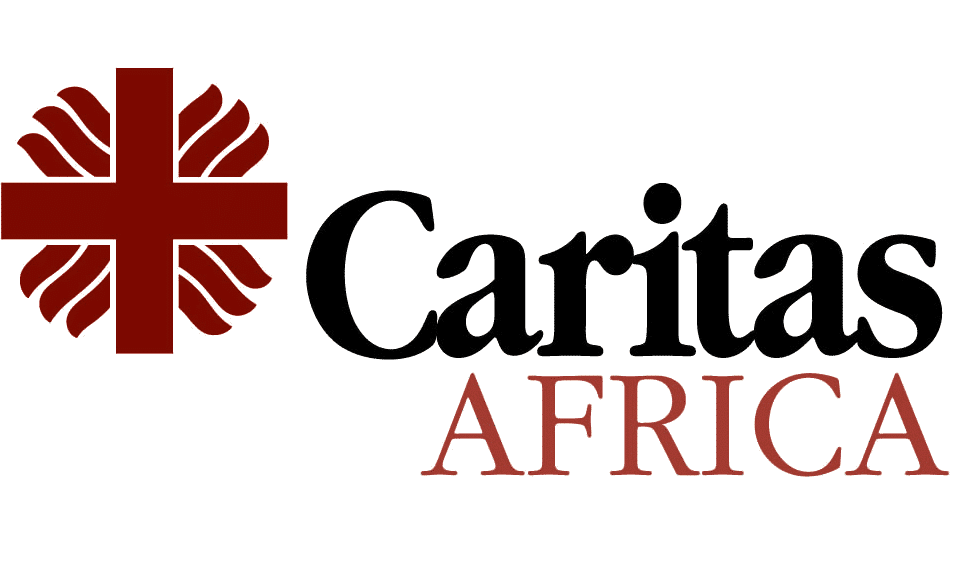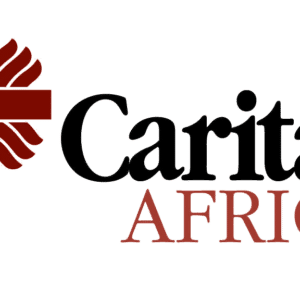Qualitative research on Food Justice in relation to Loss & Damage and Land Rights, with a focus on vulnerable women, girls as a cross-cutting priority.
December 2023 to March 2024
1. Introduction
Caritas Africa is the social pastoral ministry of the Catholic Church in Africa. It is one of the 7 Regions of the global Caritas Internationalis Confederation (162 members). Caritas Africa groups together 46 National Caritas Organisations in 46 African countries; including adjacent islands in the Atlantic and Indian Oceans. We are headquartered in Lomé, Togo and with staff in Kenya, Zambia and Malawi.
Caritas Africa’s 2024-2030 strategic framework aspires to engage Caritas Africa Member Organisations in transforming unjust structures for a fair and fraternal world (Strategic Orientation 4). It also aims to promote ecologically sound agricultural practices in view of the vulnerability of the food system to climate change among women, men, girls and boys. These vulnerabilities are mostly exhibited in particular through the disproportionate impacts of Loss &Damage on women and girls, their exposure to food injustice and relative lack of access to land rights. Furthermore, especially in relation to food production which globally remains a predominantly female responsibility.
Caritas Africa has partnered with SCIAF (Caritas Scotland) to carry out a qualitative study on “Food Justice in relation to Loss & Damage and Land Rights, with a focus on vulnerable women, girls as a cross-cutting priority”. The overarching objective of this research is to assess how an agroecological approach and securing of land-rights for local communities can help minimize and address Loss and Damage, especially for women and girls.
We are inviting written technical and financial proposals from an individual consultant, firm, study centre or an academic institution to carry out the assignment outlined in the terms of reference below.
2. Application process
The written proposal should comprise:
a) A technical proposal consisting of:
- an up-to-date curriculum vitae with: three referees
- Research methodology and a workplan, (this should not exceed 3 pages in total).
- Evidence of publications authored by the applicant (English or French).
b) Financial proposal indicating the amount to be charged for the assignment.
Selection Criteria
Caritas Africa will place great emphasis on ensuring that the objectives of this assignment are met. The selection criteria will be based on: technical capacities, understanding of food justice in relation to Loss & Damage and land rights as well as its impact on vulnerable women and girls and value for money.
A background check will be conducted in accordance to our safe recruitment procedures.
Safeguarding of children and vulnerable adults
Caritas Africa policies and procedures are grounded on the Catholic Social Teachings. We believe that all people should be valued, supported and protected from harm. All service providers/ consultants are therefore required
to act in manner that at all times safeguards the health and wellbeing of children and vulnerable adults. Familiarisation with and adherence to our safeguarding policies, including ethics and code of conduct; are an essential requirement for all service providers/ consultants in relation to the duties you are to undertake on behalf of Caritas Africa
The proposal should be submitted by e-mail no later than the close of business (17:00 UTC) on December 13, 2023. E-mail proposals should not exceed 10MB. The email address is: secaf@caritas-africa.org.
Timelines
- Mid-December 2023: A bilingual researcher recruited (French/ English) with a background in Food and Agriculture, climate change, environmental studies, social sciences and who has a demonstrated practical understanding of the research topic.
- Mid-January 2024: Inception meeting, define sample size and research methodology.
- Late January to mid-February 2024: Desktop research, documentary analysis and data collection in in Malawi, Zambia and the Democratic Republic of Congo
- February 2024: Data analysis, research validation
- March 2024: Submission of Final Research Report
- March 2024: Publication
TERMS OF REFERENCE
Background
Climate impacts are taking hold across the world and are likely to increase as the world nears, and potentially exceeds, the 1.5C temperature goal set out in Paris. A lack of investment in adaptation means that losses and damages due to climate change are higher than they might have been otherwise, and some climate impacts are unavoidable at current levels of warming regardless of adaptation efforts. The issue of L&D has dramatically risen in prominence in recent years, in response to the physical manifestation of losses and damages and bolstered by highly effective and coordinated efforts of civil society organisations and negotiators under the G77 + China grouping at the UNFCCC.
In parallel, in recent years, the world has been immersed in a global food price crisis. One of the key causes of this crisis, alongside economic shocks and the war in Ukraine, is the impact of climate change on food production. At the local level as well as national and international levels, climate induced losses and damages are therefore driving further food injustice. Minimising and addressing L&D, therefore, is a key component of securing people’s right to food globally.
Securing the right to food for everyone, everywhere, all the time requires particular safeguarding for small-scale producers in the Global South, who produce a third of the world’s food, and sustain food systems in the countries of the world most at risk of frequent food crises. Such producers are utterly reliant on the security of the land which sustains their food production, and threats to this risks significant food shocks nationally, as well as destitution for small scale producers and their families.
In the context of L&D, then, one can consider that access to land-rights are particularly important, alongside sustainable forms of agriculture which secure food sovereignty for small-scale producers. Land-rights and agroecological farming approaches can deliver stronger action to minimize L&D (adaptation) as well as address L&D, ensuring people “build back better” from disasters which destroy their land. Furthermore, these approaches can empower farmers to be masters of their own destiny and lead local responses to L&D, which are more effective in securing long-term sustainability of funding. Across each of these issues is the issue of injustice, predominantly experienced through the increased exposure to climate and food shocks by women & girls.
Key Concepts
Loss and Damage (L&D) refers to the economic and non-economic impacts of climate change that are already being incurred, some of which are beyond the limits of adaptation. This is exhibited through the impacts of extreme weather events such as floods, cyclones and wildfires, as well as through the impact of slow-onset events like sea-level rise, desertification and changing weather. The Paris Agreement commits countries to avert, minimize and address Loss and Damage. In this context, avert refers to mitigation efforts (i.e. emissions reductions), minimize refers to adaptation efforts (e.g. building flood defences), and address refers to the post- impact activities designed to help communities recover (e.g. rebuilding a bridge destroyed by a climate-associated weather event)
Food Justice is a concept that considers the global food system as a whole, and regards the lack of fulfilment of the human right to healthy food as an injustice which should be addressed by social, political and economic systems. A food justice approach pre-supposes the structural inequalities which hinder access to this right, and promotes approaches which better secure food sovereignty for everyone, everywhere, all the time.
Land Rights are at the heart of food justice. Throughout human history, land-owners have exploited food producers, and this has led to untold levels of harm for communities in every corner of the world. Furthermore, broadly, the current global approach towards management of land for food production is inadequate and has categorically failed to address world hunger. The commissioners of this research consider private property rights (such as over land) to be secondary to the right of all people to achieve Integral Human Development.
Considerations for women and girls in relation to this topic include specifically the imperative to challenge structural inequalities. These inequalities are exhibited through the disproportionate impacts of L&D on women and girls, their disproportionate exposure to food injustice and relative lack of access to land rights. Furthermore, especially in relation to food production which globally remains a predominantly female responsibility, taking women and girls, as a cross-cutting approach regards liberation of women and girls from patriarchal structures as part of the solution to these common injustices.
Research objective & questions
The overarching objective of this research is to assess how an agroecological approach and securing of land- rights for local communities can help minimize and address Loss and Damage, especially for women and girls.
1. Research Questions (non-exhaustive)
- How can securing land rights for local communities improve resilience to climate impacts and food shocks?
- How are land-grabs undermining communities’ ability to recover from climate impacts and food shocks?
- How do agroecological methods help build resilience to climate impacts?
- How do agroecological methods help restore land damaged by climate impacts?
- How are communities addressing losses and damages to land and food assets at present?
- How are women and girls being particularly exposed to climate impacts?
- How can strengthening female land rights help minimize and address losses and damages?
- How are insecurity of female land ownership and low levels of food sovereignty increasing vulnerability of women & girls to climate shocks?
2. Research Methodology
This research will require mostly qualitative and quantitative methods from secondary sources. Specifically, anticipated methods will include: literature review, Key informant Interviews, policy analysis, project data analysis, semi-structured interviews with key stakeholders in the field of agriculture, climate change, agriculture, and potentially surveys.
Three case studies are anticipated to be part of this research, obtained via Caritas Africa members in Zambia, Malawi and DRC.
3. Expected Outputs
A policy research report of up to 25 pages including:
- Inception report
- Overview of policy context
- Literature review
- Methodology chapter
- Summary of key findings
o Including case studies in Malawi, Zambia and DRC which detail, 1) actors involved in specific cases, 2) impact on local communities, 3) summary of relevant local policy responses.
Policy recommendations
o For United Nations Framework Convention on Climate Change (UNFCCC)
o For national Governments
o For donors, international financial institutions or regional bodies (e.g. African Union (AU),
Southern Africa Development Community (SADC), Economic Community of West African
States (ECOWAS) etc
- Any short case examples from conversations with relevant Caritas’s of land grabs following or in anticipation of repeated loss and damage events.




